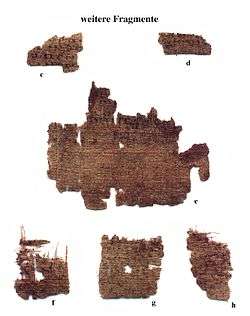Romans 9
| Romans 9 | |
|---|---|
|
Epistle to the Romans 8:12-22 in the bigger of two fragments forming Papyrus 27 (recto side), written in the 3rd century. | |
| Book | Epistle to the Romans |
| Bible part | New Testament |
| Order in the Bible part | 6 |
| Category | Pauline epistles |
Romans 9 is the ninth chapter of the Epistle to the Romans in the New Testament of the Christian Bible. It is authored by Paul the Apostle, but written by an amanuensis, Tertius of Iconium, while Paul was in Corinth, in winter of AD 57-58.[1] Paul wrote to the Roman Christians in order to give them a substantial resume of his theology.[2]
The reformer Martin Luther stated that "in chapters 9, 10 and 11, St. Paul teaches us about the eternal providence of God. It is the original source which determines who would believe and who wouldn't, who can be set free from sin and who cannot".[3]
Methodist writer Joseph Benson summarises this chapter:
- The apostle having insinuated, in Romans 3:3, that God would cast off the Jews for their unbelief, a Jew is there supposed to object, that their rejection would destroy the faithfulness of God. To this the apostle answered, that the faithfulness of God would be established rather than destroyed, by the rejection of the Jews for their unbelief.[4]
Text
- The original text is written in Koine Greek.
- Some most ancient manuscripts containing this chapter are:
- Papyrus 40 (~ AD 250 M; extant: verses 16-17, 27)
- Papyrus 27 (3rd century; extant: verses 3, 5-9)
- Codex Vaticanus (AD 325-350)
- Codex Sinaiticus (AD 330-360)
- Codex Alexandrinus (ca. AD 400-440)
- Codex Ephraemi Rescriptus (ca. AD 450; complete)
- This chapter is divided into 33 verses.

Structure
The New King James Version organises this chapter as follows:
- Romans 9:1-5 = Israel’s Rejection of Christ
- Romans 9:6-13 = Israel’s Rejection and God’s Purpose
- Romans 9:14-29 = Israel’s Rejection and God’s Justice
- Romans 9:30-33 = Present Condition of Israel
Cross references
- Romans 9:7 = Genesis 21:12
- Romans 9:9 = Genesis 18:10,14
- Romans 9:12 = Genesis 25:23
- Romans 9:13 = Malachi 1:2,3
- Romans 9:15 = Exodus 33:19
- Romans 9:17 = Exodus 9:16
- Romans 9:25 = Hosea 2:23
- Romans 9:26 = Hosea 1:10
- Romans 9:27 = Isaiah 10:22,23
- Romans 9:29 = Isaiah 1:9
- Romans 9:33 = Isaiah 8:14; Isaiah 28:16
Verse 3
- For I could wish that I myself were accursed from Christ for my brethren, my countrymen according to the flesh[5]
Alexander Kirkpatrick, in the Cambridge Bible for Schools and Colleges,[6] associates Paul's willingness to be "cursed and cut off from Christ" for the sake of his brethren [7] with Moses' prayer for the forgiveness of his wayward people ("forgive their sin – but if not, I pray, blot me out of Your book which You have written") [8] and with King David's mourning on the death of his son Absalom, "O my son Absalom – my son, my son Absalom – if only I had died in your place! O Absalom my son, my son!”.[9]
Verse 6
- But it is not that the word of God has taken no effect. For they are not all Israel who are of Israel,[10]
Verse 7
- nor are they all children because they are the seed of Abraham; but, “In Isaac your seed shall be called.”[11]
Verse 27
- Isaiah also cries out concerning Israel:
Citing Isaiah 10:22-23
Verse 28
- “For He will finish the work and cut it short in righteousness,
Citing Isaiah 10:22-23
Verse 33
- As it is written:
- “Behold, I lay in Zion a stumbling stone and rock of offense,
- And whoever believes on Him will not be put to shame.”[14]
Citing Isaiah 8:14; Isaiah 28:16
See also
- Other related Bible parts: Genesis 18, Genesis 21, Genesis 25, Exodus 9, Exodus 33, Isaiah 1, Isaiah 8, Isaiah 10, Isaiah 28, Hosea 1, Hosea 2, Malachi 1
References
- ↑ Halley, Henry H. Halley's Bible Handbook: an Abbreviated Bible Commentary. 23rd edition. Zondervan Publishing House. 1962.
- ↑ Holman Illustrated Bible Handbook. Holman Bible Publishers, Nashville, Tennessee. 2012.
- ↑ Luther, M., Preface to the Letter of St. Paul to the Romans, translated by Andrew Thornton, OSB
- ↑ Benson's Commentary on Romans 9, accessed 22 September 2016
- ↑ Romans 9:3
- ↑ Cambridge Bible for Schools and Colleges on 2 Samuel 18, accessed 12 August 2017
- ↑ Romans 9:3 Revised Standard Version
- ↑ Exodus 32:32
- ↑ 2 Samuel 18:33
- ↑ Romans 9:6
- ↑ Romans 9:7
- ↑ Romans 9:27
- ↑ Romans 9:28
- ↑ Romans 9:33
